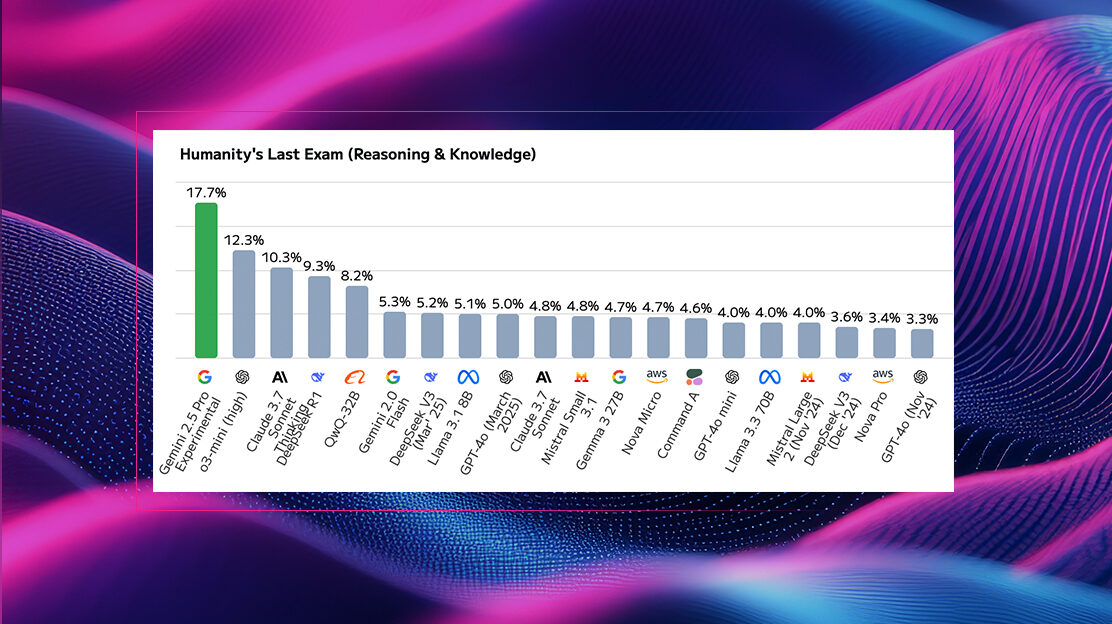Google's Gemini 2.5 ranks first in coding charts, AI IQ tests
Google's (NASDAQ: GOOGL) Gemini 2.5 has come out on top across a range of artificial intelligence (AI) testing benchmarks, outperforming the rest of its peers. According to the rankings, the AI chatbot sits on top of the leaderboard on WebDev Arena, an AI ranking site for coding. A quick scan of WebDev Arena reveals that Gemini 2.5 ranks ahead of Claude and ChatGPT 4 in standardized coding tests for large language models (LLMs).
Performance in Various Tests
Apart from setting the pace in coding functionalities, Gemini 2.5 also clinched first place in creative writing and style control. When placed in standardized IQ tests, Gemini 2.5 outclassed its peers to achieve an IQ of 124 on the Mensa Norway test. However, the model scored 115 in offline mode, ranking in joint second place with OpenAI’s ChatGPT.
Gemini 2.5 scored 86.7% and 84% on the AIME 2025 math test and the GPQA science assessment, respectively. Despite scoring only 18.8% on Humanity’s Last Exam, Gemini came first, outperforming Claude 3.7 Sonnet and OpenAI’s o3.

Context Window Advantage
Gemini 2.5’s successes across the board are propped by its context window, allowing up to 1 million tokens. Its closest competitors, Claude and ChatGPT’s flagship models, are only designed to handle 128K tokens, with Gemini 2.5 ranking above the field. Google has unveiled plans to expand the context window to 2 million tokens.

“Gemini 2.5 models are thinking models, capable of reasoning through their thoughts before responding, resulting in enhanced performance and improved accuracy,” said Google in a statement during its commercial release.
Enterprise Functionalities
A pro version pushes the frontiers for Gemini 2.5, with costs starting at $2.50 and $15.00 for input and output costs. Google’s Gemini 2.5 is significantly cheaper than its peers, offering advanced enterprise functionalities, including blockchain-based smart contract audits.
Real-world AI Use Cases Heat Up
Apart from the academic discourse around AI models, real-world applications are rising. AI chatbots are changing the landscape in the workplace, offering automation and advanced personalization perks for consumers. Governments are also turning to AI to improve the scope of public services for citizens, but concerns over misuse remain. The UN has warned of the potential risks stemming from AI abuse, including censorship and the proliferation of fake news, while authorities are cracking down on misuse in financial markets.
Microsoft-funded Space and Time goes live with an array of major builders
Space and Time, a new blockchain project, has launched its mainnet to offer advanced data infrastructure using zero-knowledge (ZK) proofs. Space and Time allow developers to access large datasets off-chain and verify their accuracy on-chain using smart contracts. The Microsoft-backed Space and Time leans on major distributed ledgers to index data while providing a safe platform for developers to query gleaned data via its proprietary Proof of SQL.

Space and Time’s Proof of SQL mechanism verifies that an SQL query on a dataset is accurate despite off-chain computations. Each query result is wrapped as a ZK proof and submitted to a distributed ledger for smart contracts to verify their proof.
“Prior to Space and Time, onchain applications had no way to query basic user data from a database of blockchain activity without introducing security risks and tampering,” said Space and Time co-founder Scott Dykstra.
Blockchain Use Cases Outside DeFi Continue to Surge
Outside of DeFi, blockchain records myriad utilities across cybersecurity, artificial intelligence, Internet of Things (IoT), and supply chain. To stifle the trend of AI misinformation, researchers are turning to blockchain to fight bias and deepfakes, with one report tagging the technology as the missing link for trust. Blockchain is also being used in public services, with governments rolling out Web3-based solutions around subsidies and digital IDs. An integration of blockchain with IoT is tipped to solve a slew of climate change issues, with previous use cases in agriculture yielding benefits.
In order for artificial intelligence (AI) to work right within the law and thrive in the face of growing challenges, it needs to integrate an enterprise blockchain system that ensures data input quality and ownership—allowing it to keep data safe while also guaranteeing the immutability of data. Check out CoinGeek’s coverage on this emerging tech to learn more why Enterprise blockchain will be the backbone of AI.
![ask] Gemini 2.5 is support 1M contex? - Discussion - Cursor](https://us1.discourse-cdn.com/flex020/uploads/cursor1/original/3X/2/5/25637e4b9fff79ab2b0c264455ad34cc54964e16.png)
As the first media outlet to report on blockchain-powered applications, we provide early adopters, developers, and visionary leaders with access to emerging technological landscapes, including wallets and games.










